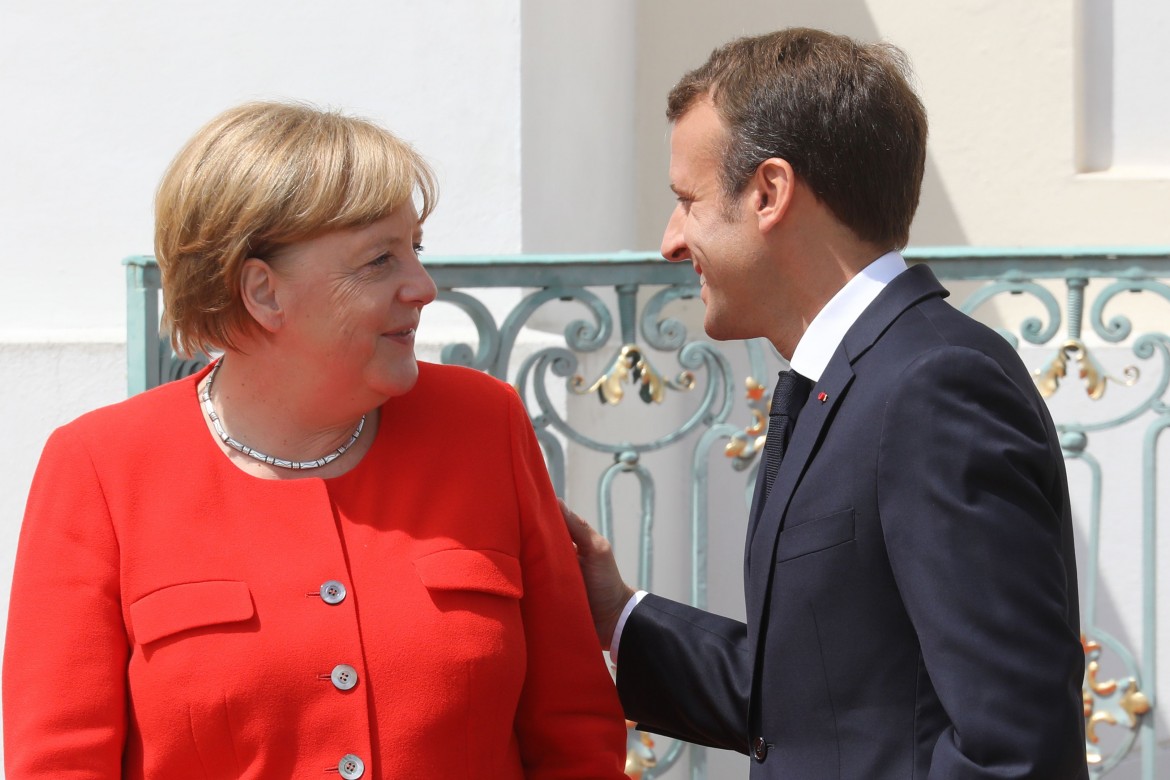Analysis
The 10 days that can change Europe
Angela Merkel and Emmanuel Macron met this week in Germany to discuss two upcoming meetings that could come to define Europe over two issues: immigration and finance.

Over the next 10 days, European leaders will confront the refugee emergency and seek out an economic plan, with a European Council meeting scheduled for June 28-29 and a Eurogroup meeting on Friday, at which Greece hopes to end the painful bailout program.
Ahead of these gatherings, Angela Merkel received Emmanuel Macron on Tuesday at the Franco-German Council of Ministers in the Meseberg Castle, near Berlin. European Commission President Jean-Claude Juncker was also present at the summit, which was an exceptional event. Initially, the meeting in Meseberg was to be focused on the EU budget, to seek a point of convergence between the German and French positions. However, a political crisis on migrants took over the discussion after Italy refused to honor maritime customs and rejected the rescue vessel Aquarius.
In each of their countries, they’re facing gales of nativist opposition. In Germany, Interior Minister Horst Seehofer (a Bavarian of the CIS) openly challenged Merkel. “Crazy Horst” threatened the chancellor with an ultimatum, ordering her to find a solution within 10 days, otherwise he will close the borders of Germany to secondary immigration, those exiled from other EU countries, who would be returned to the country of first entry. (Berlin so far has agreed to continue examining asylum applications.) And in France, the Senate on Tuesday was discussing the asylum-immigration law, already very restrictive, but which the right wing (which dominates the Palais de Luxembourg) has further stiffened.
For Europe, this is “a moment of truth” of civilizational proportions, Macron said. Macron and Merkel agreed that the migration crisis requires “greater solidarity,” and the response must be “European and coordinated,” respecting “the balance between responsibility and solidarity.”
However, the factual realization of this general proposal is problematic. It strengthens Frontex, transforming the program into a real border police (without, however, specifying how and to what extent). And the references to the distribution of migrants and to a possible compromise between the EU countries remains vague. The temptation of Brussels and some national capitals is to open hotspots outside the EU (from the Sahel to the Balkans), or to build a kind of Ellis Island somewhere on the Mediterranean coast outside the EU (a port where liferafts can dock). These notions were not analyzed in depth in Meseberg.
Nor did they get into specifics about the adoption of common rules in the EU for political asylum, which would avoid dangerous wanderings to cross internal borders. (In the French debate, this has been called without humanity the “benchmarking” of migrants, who are comparing national legislation and “shopping” for asylum.)
Macron and Merkel’s vague terms on responses to the reception crisis confirm that at the European Council at the end of June there will be no agreement among the 28 on the Dublin reform.
More concrete progress has been made on the reform of the euro area. Negotiations have been going on for years, although Merkel recalled that it hasn’t been the easiest thing to reach an agreement. She and Macron did not release details to avoid irritating partners by presenting a road map already done (the Netherlands, for example, remains totally opposed).
But there is the significant step forward (on the German side) on a common budget of the euro area since 2021, an indispensable tool to deal with an asymmetric crisis (affecting a state). The order of magnitude has not been specified. Macron has spoken of a budget for various GDP levels. Merkel, meanwhile, fears becoming the wallet for “bad states” that take on deficits.
There is also an idea floating around of financing the eurozone budget with both a tax on financial transactions and a tax on large multinationals (Google, Apple, Facebook, Amazon, Microsoft) specializing in tax optimization.
On Tuesday morning in Paris, the Commissioner for Monetary Affairs, Pierre Moscovici, pointed out that the Commission was well aware that “a two-speed eurozone is an existential risk” and that the idea of there being “winners and losers” in the eurozone must be avoided.
Moscovici has promised that, for Greece, which should see the end of the tunnel after eight years at the Eurogroup on Thursday, there will be no “hidden agenda” to perpetuate austerity, but a return to normality.
Originally published at https://ilmanifesto.it/i-dieci-giorni-che-possono-cambiare-leuropa/ on 2018-06-20
